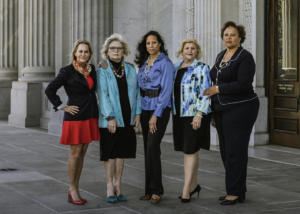The Unexpected Women Blocking South Carolina’s Near-Total Abortion Ban

This article was originally published in The New York Times by Kate Zernike
When the United States Supreme Court overturned Roe v. Wade last summer, advocates on either side presumed that the country would divide along the bright color lines: red states completely banning abortion, blue states protecting it.
That prediction failed to anticipate the Sister Senators.
The Sisters, as they call themselves, are the women in the South Carolina State Senate — the only women, three Republicans, one Independent and one Democrat, in a legislature that ranks 47th among states in the proportion of women. As a block, they are refusing to allow the legislature to pass a near-total ban on abortion, despite a Republican supermajority.
Three times in eight months, Republican leaders in the chamber have tried to ban abortion beginning at conception. Three times, the women have resisted, even as fellow Republicans have threatened primary challenges and anti-abortion activists have paraded empty strollers and groups of children heckling the women as “baby killers.”
Before the most recent debate started in April, the anti-abortion group Students for Life dropped off gift bags at the offices of the three Republican women containing plastic spines, infant size but intended to encourage the women to grow one, with notes signed, “the pre-born.”
The women filibustered, taking the gifts to the podium on the Senate floor to declare themselves even more firmly in resistance. “I’ve got one hell of a spine already, but now I’ve got another backup,” Senator Katrina Shealy said, flanked by the two other Republican women, all holding their plastic spines like trophies.
After three days of debate, during which the women spoke for as long as four hours each at a time, Senate leadership acknowledged — again — that it did not have the votes to pass the ban.
“I don’t think the Republican Party saw us coming, because we didn’t do what they thought we were going to do,” Ms. Shealy, the senior member of the group, said in an interview with the other women around a table in her State House office. “They thought we would do just what they told us to do.”
But as men argued that abortion was killing babies, the five women insisted that abortion bans are about controlling women — and that they will not be controlled. They have argued the ban reduces women to “baby machines” like the dystopia of “The Handmaid’s Tale” and rejected as ludicrous claims from male legislators that women use abortion as birth control.